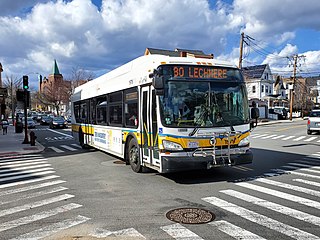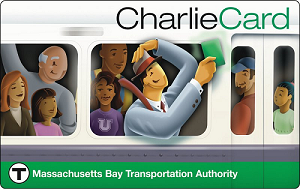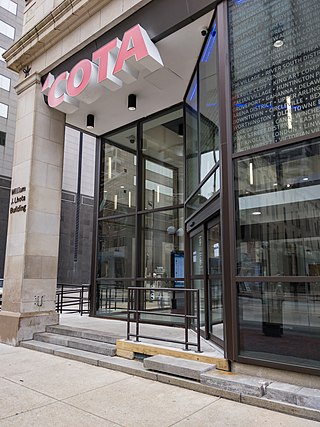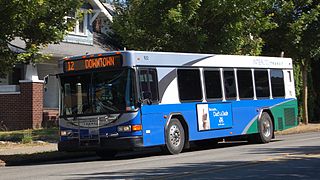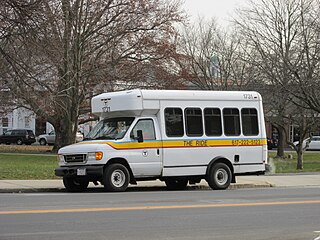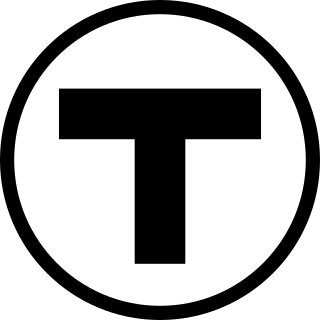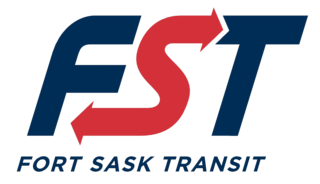Boston
| ||
|---|---|---|
Boston City Councilor Mayor of Boston
| ||
Early proposals
Matthew Haugen of Nonprofit Quarterly credits grassroots support for the idea of free public transit in Boston in the 2010s as coming from groups such as Alternatives for Community and Environment, particularly that group's transit-oriented development director, Mela Bush-Miles. [1]
City Councilor Michelle Wu argued that the Massachusetts Bay Transportation Authority (MBTA) should explore the possibility of eliminating fares in a January 31, 2019 op-ed published in The Boston Globe . [2] Later in 2019, she and City Councilor Kim Janey proposed making the MBTA Route 28 bus fare-free. [3] Wu's August 2020 proposal for a Boston Green New Deal incorporated a call for Boston to pursue fare-free public transportation. [4] Crediting Councilwoman Wu as a leader on free public transit, in January 2021, the editorial board of The Boston Globe endorsed the idea of making Boston's buses fare-free. [5] Wu would come to be considered a prominent voice in both the local and national push for free public transit. [1] [6]
Limited free transit pass pilot program (2021)
In March 2021, Kim Janey, at the time the city of Boston's acting mayor, announced a pilot program that would offer 1,000 workers in five of the city's business districts (East Boston, and Fields Corner, Jamaica Plain, Mission Hill, Nubian Square, Three Squares) free MBTA and Bluebikes passes with up to $60 in credit. [7] [8]
Fare-free MBTA bus route pilot program (2021–present)

In June 2021, Acting Boston Mayor Janey announced that the city would be funding a $500,000 three-month pilot that would see the MBTA's Route 28 bus be made fare-free. In 2019, as a city councilor, she and fellow councilor Michelle Wu had previously called for this bus route to be made fare-free. [9]
The city, in November 2021, announced that its data showed that during the pilot program ridership had increased to an excess of 70,000 in weekly ridership. Pre-COVID-19 pandemic weekly ridership on the route had been 47,000, making the COVID-era pilot program ridership significantly greater despite the general impact of the COVID-19 pandemic on public transportation rider. The city concluded that, in comparison to ridership trends on comparable routes of the MBTA, the increase in ridership was directly attributable to the pilot program. [10] A later more in-depth 2022 analysis found an overall 38% increase in weekday ridership from 7,500 before the pandemic to 10,200 during the September and October periods during the pilot program. [11] [12]
During the 2021 Boston mayoral election, in which Kim Janey and Michelle Wu were candidates, fellow candidate Andrea Campbell voiced her support for making all of the city's buses fare-free. Candidate John Barros supported making ridership free for some low-income riders on select bus lines. [13] Candidate Annissa Essaibi George was critical of the idea of free public transport, questioning its feasibility. [14] [15]

In December 2021, Michelle Wu, who had won the 2021 mayoral election and was now mayor of Boston, extended the pilot program by two months. [16] Wu afterwards succeeded in launching a two-year program to have the MBTA Route 23, 28, and 29 buses run fare-free for two years, with this program beginning on March 1, 2022. [17] [18] [19] These buses serve the Dorchester, Mattapan, and Roxbury communities. [18] Wu's mayoral campaign had included advocacy for fare-free public transit with the catchphrase "Free the T" ("the T" being a nickname for the MBTA). She filed paperwork for this expansion of the pilot program on her first day as mayor. [20] In mid-November 2021, Wu had sent an appropriations order to the Boston City Council requesting their approval to appropriate $8 million of federal funds to fund the two years of fare-free service on the three bus routes. [18] [19] The funds are COVID-19 pandemic relief funds. [21] [22] At the start of December, the City Council approved the appropriations order 12–1. [23] On February 9, 2022, it was announced by Wu and MBTA General Manager Steve Poftak that the two-year program for the three routes to be fare-free was officially agreed to and would be launched on March 1, 2022. [24] [17]
In February 2022, a report was released by MBTA that showed that in the initial pilot, Route 23 saw a 20% increase in ridership. However, the report showed that due to the limited scope of the pilot, impacting only one line, 66% of riders on the route did not save money on fares as they were required to purchase transit passes for connecting trips. The report also claimed that the fare-free service decreased travel time on the route, with there being a 20% reduction in lag time at stops due to the elimination of fare collection. [25] The initial pilot program had seen the line reach 90% of the pre-pandemic ridership numbers. [21]
Reports show that between February 2021 and February 2023, average weekday ridership on the three lines included in the pilot program had doubled: [26]
- Route 23 increased from 4,783 average weekday ridership to 10,185 [26]
- Route 28 increased from 5,571 average weekday ridership to 10,905 [26]
- Route 29 increased from 735 average weekday ridership to 1,652 [26]
Reports also showed that average weekday ridership had also increased on all three lines by February 2023 compared to pre-COVID-19 pandemic ridership numbers. This came in contrast a 21% overall decrease in average weekday ridership on the whole MBTA bus system compared to pre-pandemic ridership (February 2023 vs. February 2020). [26]
- Route 23 had 10,185 average weekday riders in February 2023 compared to 8,845 in February 2020 [26]
- Route 28 had 10,905 average weekday riders in February 2023 compared to 9,128 in February 2020 [26]
- Route 29 had 1,652 average weekday riders in February 2023 compared to 1,591 in February 2020 [26]
According to a rider survey released in March 2023, 26% percent of passengers on the three fare-free routes saved in excess of $20 per month due to the elimination of fares on those routes. [27] [28] The survey also revealed that 15% of rides on the three bus lines are trips that otherwise would not have been taken using any mode (public or private) in the absence of the fare-free public transit options. [27] [29] At the end of the two-year pilot, the city reported that riders had saved more than $6 million on fares in its two-year run, with half of the riders having savings which averaged $35 per month. [30]
Boston, by late-2022, was looking at further expansion of the program. [31] By April 2023, there were discussions between Boston, Cambridge, and MBTA about additionally making MBTA Route 1 fare-free. [32] In February 2024, the city authorized a $8.4 million two-year extension of the three-route pilot into 2026. [33]
Two-month fare-free service on the MBTA Blue Line (July and August 2023)
During the temporary closure of Boston's Sumner Tunnel (scheduled to last July 5 through August 31, 2023), the MBTA Blue Line rapid transit line ran fare-free. [34] [35]
Other MBTA fare-free service
On New Year's Eve in December 2022, the MBTA offered fare-free late-night service on all of its services. [36] [37]







